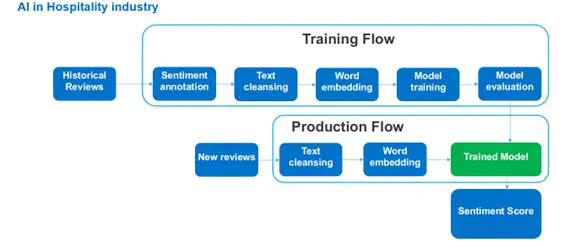Semantic Analysis - Customer Reviews

In today’s world, customer feedback is critical for any business to succeed. The hotel industry is no exception, and customer reviews can make or break a hotel’s reputation. To ensure that hotels provide the best possible service, it’s essential to understand customer reviews’ sentiment. Semantic analysis is a powerful tool that can help with this task.
This project aims to use machine learning to classify customer reviews on each hotel as positive, negative, or neutral. The project consists of two main flows, the training flow and the production flow.
The training flow begins with sentiment annotation, where human annotators label each review’s sentiment. Then, text cleansing is performed to remove any irrelevant information. After that, the text is transformed into word embeddings, a technique that represents words as vectors. The model is then trained using this data, and the model evaluation is carried out to check the accuracy of the model.
In the production flow, text cleansing and word embedding are performed on the new reviews, and the trained model is used to provide a sentiment score. The sentiment score is then used to classify the review as positive, negative, or neutral.
The goal of this project is to provide hotels with an automated way to analyze customer reviews and get insights into their customers’ sentiments. With this information, hotels can identify areas for improvement and make changes to provide better service to their customers. Overall, this project demonstrates the potential of machine learning and semantic analysis to improve customer satisfaction and drive business success.